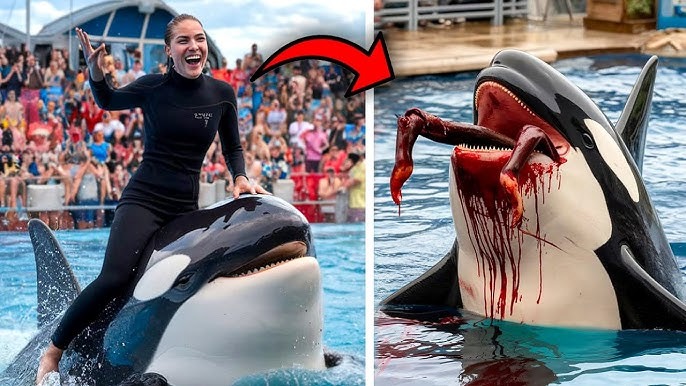A disturbing video spreading across TikTok and Facebook claims 23-year-old marine trainer Jessica Radcliffe was fatally attacked by an orca during a performance. The clip, viewed millions of times, mixes real footage of killer whales with a graphic narrative: Radcliffe was “mauled” in front of spectators and died “within ten minutes of rescue.” But a thorough investigation reveals the story is entirely fabricated. No evidence supports the incident, and marine experts confirm no such attack occurred.
The hoax stitches together unrelated elements to appear credible. It uses authentic marine park footage likely sourced from stock libraries or documentaries while inventing characters and events. Jessica Radcliffe’s identity is unverified; no records match her name in marine biology or training databases. The video also references past orca incidents, like the 2010 death of SeaWorld trainer Dawn Brancheau, to exploit public familiarity with real tragedies.

Why the Hoax Gained Traction
Orca attacks carry visceral fear, amplified by documentaries like Blackfish detailing captive whales’ psychological trauma. The fictional narrative mirrors documented cases, making it feel plausible. Dr. Elena Martinez, a marine biologist, explains: “People associate orcas with rare but real incidents. Hoaxes weaponize this by repackaging history as breaking news.” Social media algorithms further accelerate such content, prioritizing engagement over authenticity.
Tactics of Deception
Fact-checkers note the video employs three manipulation tactics:
-
Emotional hooks: Graphic details (“blood in the water”) trigger shock and shares.
-
Visual legitimacy: Authentic footage distracts from invented audio or text overlays.
-
Fabricated sources: Citations of fake local news outlets lend false credibility.
Platforms face criticism for slow responses. TikTok added a cautionary label only after the video surpassed 2 million views. Facebook’s third-party fact-checking partners, like Reuters, confirmed the story’s falsity but not before it spread across 20,000 groups.
The Real Damage
Misinformation erodes trust in legitimate science. Marine conservation groups report a surge in fearful queries about orca safety, diverting resources from education. “Fiction hinders real work,” says researcher Mark Chen. “We’re debunking myths instead of discussing habitat protection.” Victims like Dawn Brancheau’s family also endure renewed trauma when hoaxes resurface their loss.
How to Spot Similar Hoaxes
Experts advise checking three elements:
-
Source transparency: Legitimate reports name parks, witnesses, and authorities.
-
Recent evidence: Reverse-image searches often trace “new” footage to older videos.
-
Expert corroboration: Accredited institutions (e.g., SEA International) publicly confirm incidents.
Platforms must strengthen AI detection of repurposed footage and empower users with prompt fact-checks. Until then, skepticism remains vital. As Martinez warns, “If a story feels designed to horrify, pause and verify”.
The Radcliffe hoax underscores a chilling truth: Digital misinformation moves faster than truth. Combating it demands vigilance from users and responsibility from platforms.
Subscribe to my whatsapp channel


Comments are closed.